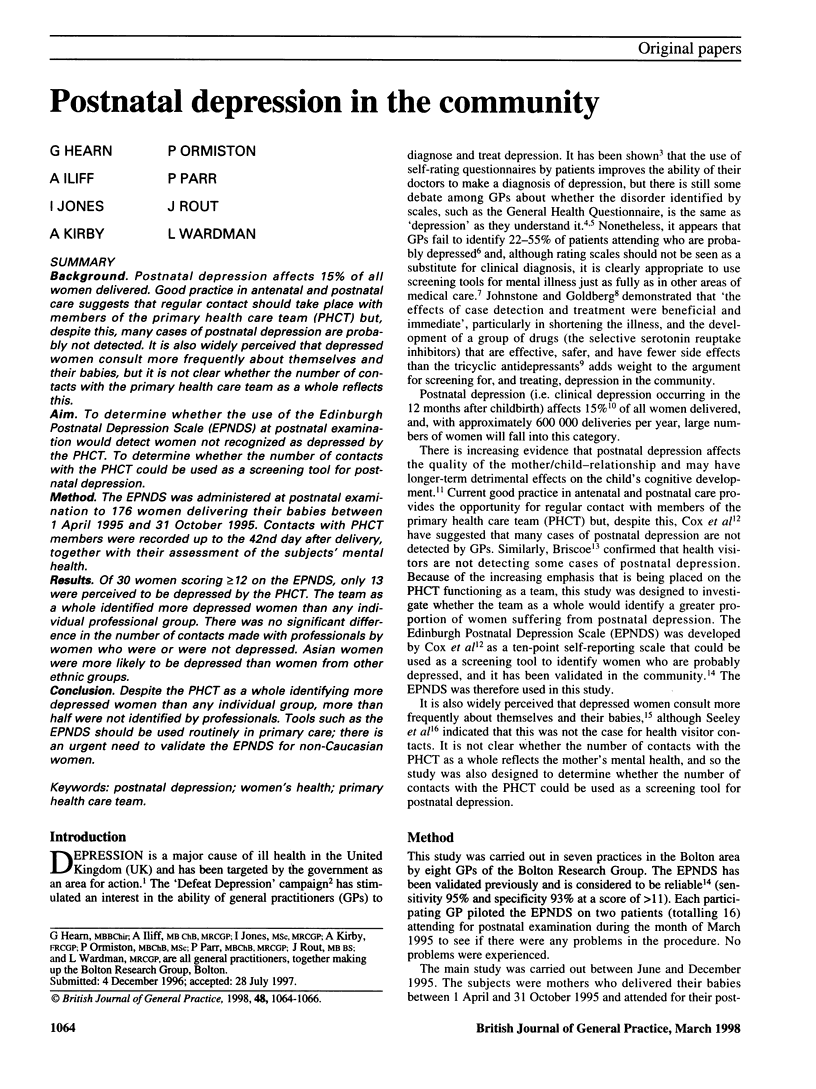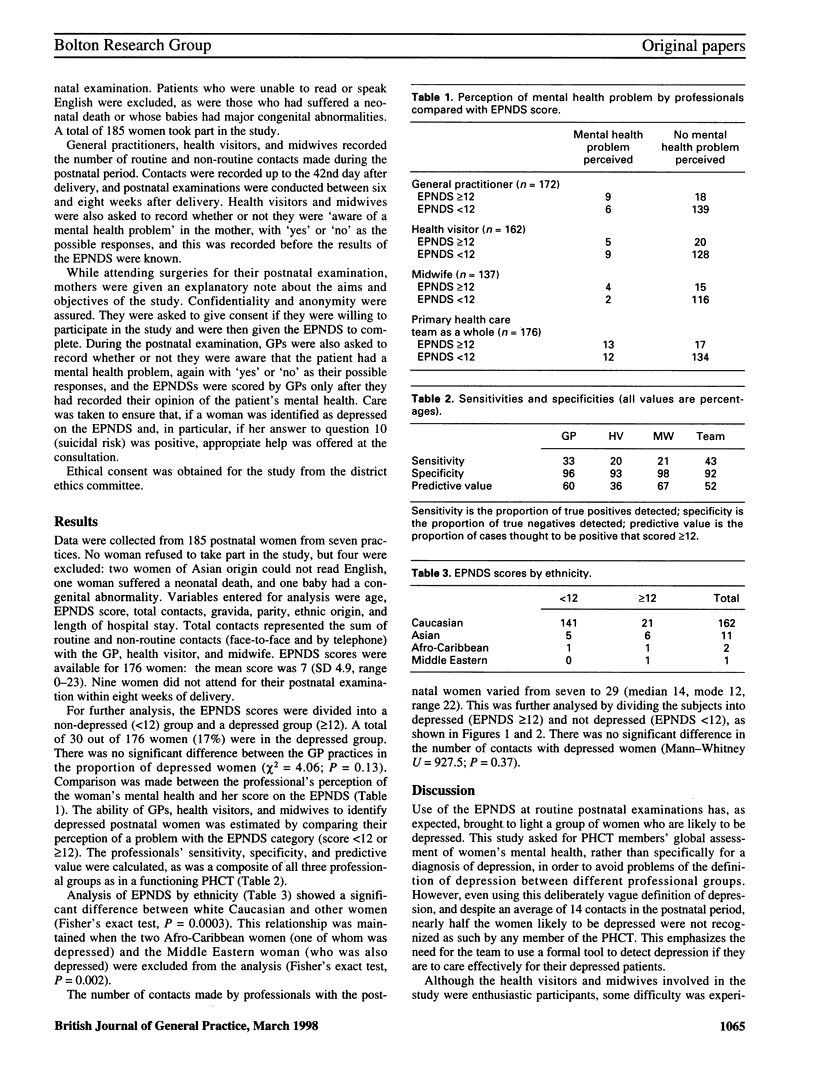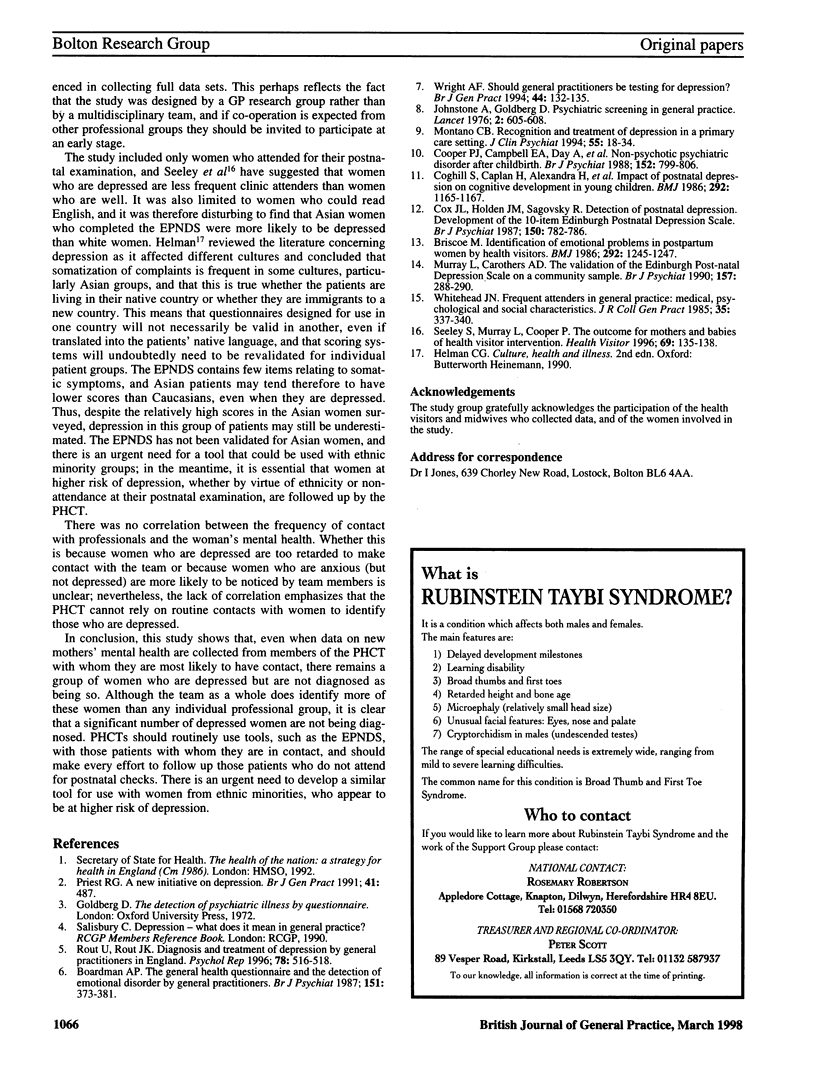Abstract
BACKGROUND: Postnatal depression affects 15% of all women derived. Good practice in antenatal and postnatal care suggests that regular contact should take place with members of the primary health care team (PHCT) but, despite this, many cases of postnatal depression are probably not detected. It is also widely perceived that depressed women consult more frequently about themselves and their babies, but it is not clear whether the number of contacts with the primary health care team as a whole reflects this. AIM: To determine whether the use of the Edinburgh Postnatal Depression Scale (EPNDS) at postnatal examination would detect women not recognized as depressed by the PHCT. To determine whether the number of contacts with the PHCT could be used as a screening tool for postnatal depression. METHOD: The EPNDS was administered at postnatal examination to 176 women delivering their babies between 1 April 1995 and 31 October 1995. Contacts with PHCT members were recorded up to the 42nd day after delivery, together with their assessment of the subjects' mental health. RESULTS: Of 30 women scoring > or = 12 on the EPNDS, only 13 were perceived to be depressed by the PHCT. The team as a whole identified more depressed women than any individual professional group. There was no significant difference in the number of contacts made with professionals by women who were or were not depressed. Asian women were more likely to be depressed than women from other ethnic groups. CONCLUSION: Despite the PHCT as a whole identifying more depressed women than any individual group, more than half were not identified by professionals. Tools such as the EPNDS should be used routinely in primary care; there is an urgent need to validate the EPNDS for non-Caucasian women.
Full text
PDF


Selected References
These references are in PubMed. This may not be the complete list of references from this article.
- Boardman A. P. The General Health Questionnaire and the detection of emotional disorder by General Practitioners. A replicated study. Br J Psychiatry. 1987 Sep;151:373–381. doi: 10.1192/bjp.151.3.373. [DOI] [PubMed] [Google Scholar]
- Briscoe M. Identification of emotional problems in postpartum women by health visitors. Br Med J (Clin Res Ed) 1986 May 10;292(6530):1245–1247. doi: 10.1136/bmj.292.6530.1245. [DOI] [PMC free article] [PubMed] [Google Scholar]
- Cogill S. R., Caplan H. L., Alexandra H., Robson K. M., Kumar R. Impact of maternal postnatal depression on cognitive development of young children. Br Med J (Clin Res Ed) 1986 May 3;292(6529):1165–1167. doi: 10.1136/bmj.292.6529.1165. [DOI] [PMC free article] [PubMed] [Google Scholar]
- Cooper P. J., Campbell E. A., Day A., Kennerley H., Bond A. Non-psychotic psychiatric disorder after childbirth. A prospective study of prevalence, incidence, course and nature. Br J Psychiatry. 1988 Jun;152:799–806. doi: 10.1192/bjp.152.6.799. [DOI] [PubMed] [Google Scholar]
- Cox J. L., Holden J. M., Sagovsky R. Detection of postnatal depression. Development of the 10-item Edinburgh Postnatal Depression Scale. Br J Psychiatry. 1987 Jun;150:782–786. doi: 10.1192/bjp.150.6.782. [DOI] [PubMed] [Google Scholar]
- Johnstone A., Goldberg D. Psychiatric screening in general practice. A controlled trial. Lancet. 1976 Mar 20;1(7960):605–608. doi: 10.1016/s0140-6736(76)90415-3. [DOI] [PubMed] [Google Scholar]
- Montano C. B. Recognition and treatment of depression in a primary care setting. J Clin Psychiatry. 1994 Dec;55 (Suppl):18–37. [PubMed] [Google Scholar]
- Murray L., Carothers A. D. The validation of the Edinburgh Post-natal Depression Scale on a community sample. Br J Psychiatry. 1990 Aug;157:288–290. doi: 10.1192/bjp.157.2.288. [DOI] [PubMed] [Google Scholar]
- Priest R. G. A new initiative on depression. Br J Gen Pract. 1991 Dec;41(353):487–487. [PMC free article] [PubMed] [Google Scholar]
- Rout U., Rout J. Diagnosis and treatment of depression by general practitioners in England. Psychol Rep. 1996 Apr;78(2):516–518. doi: 10.2466/pr0.1996.78.2.516. [DOI] [PubMed] [Google Scholar]
- Westhead J. N. Frequent attenders in general practice: medical, psychological and social characteristics. J R Coll Gen Pract. 1985 Jul;35(276):337–340. [PMC free article] [PubMed] [Google Scholar]
- Wright A. F. Should general practitioners be testing for depression? Br J Gen Pract. 1994 Mar;44(380):132–135. [PMC free article] [PubMed] [Google Scholar]


